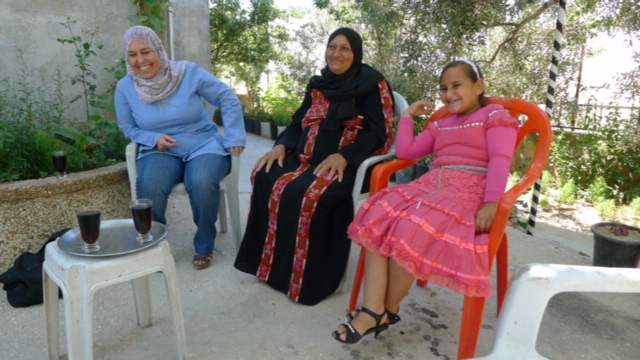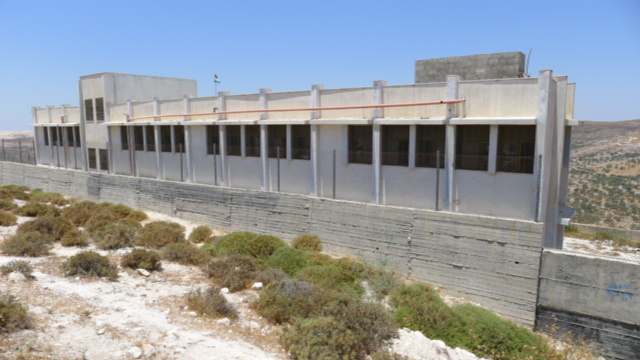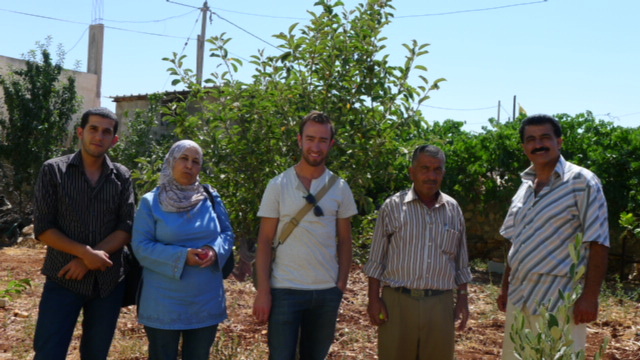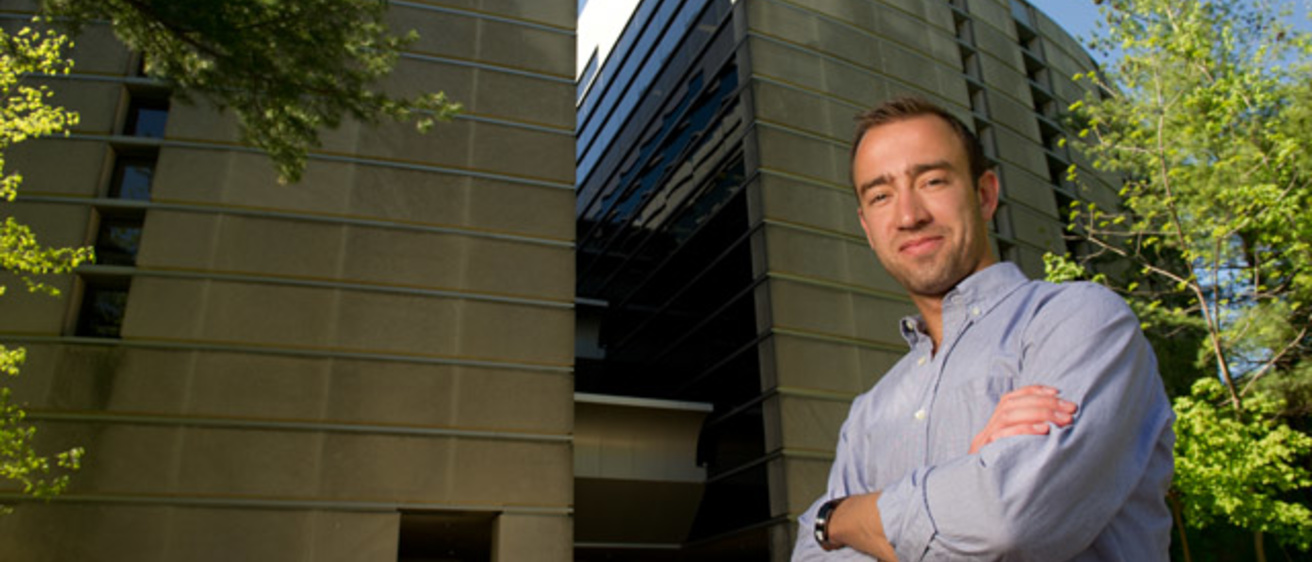Drew Craig knows when many people think of the West Bank it evokes thoughts of youth hurling stones and military rocket attacks.
Craig, a 2013 University of Iowa College of Law graduate, conjures very different images.
One of the most vivid is a 7-year-old Palestinian girl wearing a bright pink dress. She dutifully stands guard at the edge of her family's farmland—protecting their vegetable fields and olive and almond trees and ensuring military members do not harm her family's only means of livelihood.

"When her family had to go work in the fields, her job was to look out for settlers," Craig says. "She had to watch out for Israeli settlers who would come down to the village, accompanied by Israeli soldiers, and cut down trees, throw rocks, and sometimes fire on rooftop tanks storing drinking water."
Craig says when he was 7, he spent carefree Saturdays watching cartoons.
It was injustices such as these that compelled the 26-year-old to seek an internship abroad, a growing trend at the UI.
He also recalls the hospitality and kindness of families who opened their homes, sharing water from a single silver cup because of how precious a resource water was and filling him up on meals of kibbee, taboon bread, and coffee. Or a councilman from a village he visited begging him to go back to the United States and tell people that not all Palestinians are terrorists; that they merely wished to farm the land their ancestors had lived on for 500 years.
Wanting to make a difference
Though he knows it sounds like a cliché, Craig says he pursued this experience because he wanted to make a difference.
The Cedar Rapids native, whose father is an attorney, says he plans to specialize in international humanitarian law. The internships abroad provided great experience toward that goal.
For six months, Craig lived in Ramallah, Palestine, working with two different organizations. For the first three months, June to September of 2012, he worked with a nongovernmental organization, Defence for Children-Palestine(DCI).
DCI does both legal work and international advocacy for Palestinian children. DCI lawyers primarily represent Palestinian children in the Israeli military courts.
His second internship, from September through December, was spent working with the Al Mustakbal Foundation (AMF) for Strategic and Policy Studies. While he worked at AMF, Craig helped plan and implement an entrepreneurial training program for young Palestinians and conducted institutional research on Palestinian statehood.
While there, Craig also took a law class at Hebrew University in Jerusalem, gaining academic credit toward his juris doctor degree. Craig’s professor was formerly involved with negotiations on the Israeli side, his supervisor in Ramallah consulted directly with the Palestinian negotiation support unit, his roommates in Ramallah were Palestinian, and he attended dinners and parties with Israelis and current and former members of the Israeli military while visiting Israel.
“It was very interesting, going from class in Jerusalem to work where my supervisor at AMF was a Palestinian negotiator. I was able to gain different perspectives from every relationship and friendship I had,” Craig says. He adds that one of his roommates was a refugee, and so the two would spend weekends visiting his roommate’s family in al Arroub refugee camp.
“I’d go and stay in his refugee camp,” Craig says, “and if I brought anything back with me from staying in that camp and visiting Palestinian villages, it was the knowledge that though the killings and settler violence are horrible, the daily grind, things like a 7-year-old girl having to be on lookout, those were equally horrible.”

To get to his class, Craig had to go through military checkpoints as he left Palestine and entered Israel. Due to demonstrations in November related to the Gaza air strikes, there were days when he was also unable to attend class.
Since Craig does not speak Arabic, language barriers prevented him from being deeply involved in courtroom work while with DCI. Instead, he worked primarily with DCI’s advocacy team documenting human rights violations by Israeli military and Israeli settlers in the West Bank.
In three months, he had new cases almost daily. The most common were cases of Palestinian children arrested by the Israeli military on a variety of charges and put in detention in Israeli prisons.
The most common violation was throwing stones, Craig says. They also documented everything from fatalities to the daily struggles of Palestinian youth such as getting access to water and walking to school safely without being detained, harassed, or harmed.
"I wasn't able to meet a lot of children directly," Craig says. "We were doing primarily office work. I took cases from the field and turned them into something that could be passed on to the media, the United Nations, or governments."
However, the ones he did meet, such as the little girl in the pink dress, had a profound impact.
Craig says fieldworkers fluent in Arabic would often visit with the victim or their family, friends, or other witnesses the same day. Then translators would convert the documents to English. The content would then come to Craig's advocacy department, where they distilled the information and brought out the legal issues looking to documents such as the Geneva Conventions and international human rights treaties.
Interest in foreign affairs sparks experience
The seed for traveling to the West Bank was first planted while Craig was an undergraduate at Marquette University when he heard a guest speaker who was an attorney working with Palestinians.
"I was interested in foreign affairs. I knew I wanted to live abroad," Craig says, adding he lived in the Czech Republic for one year, teaching English after he received his undergraduate degrees in economics and a minor in philosophy.
Craig says he was familiar with the conflict but not in a meaningful way.
Though he had no personal connections with Israelis or Palestinians prior to pursuing this internship, he read as many media outlets as he could and did several legal research papers on the conflict prior to traveling there.
"My interest in the law and my interest in Israel and Palestine came together, after that I just needed to find an organization, and for that, I turned to Google," Craig says.
For more information on pursuing an internship abroad, visit international.uiowa.edu/study-abroad/intern-abroad.
He adds that Study Abroad staff in UI International Programs helped him obtain mandatory travel insurance, which included an evacuation plan should he have needed it. Craig also received a number of grants, including funding from the Kenneth J. Cmiel Human Rights Internship Program and the Annette Stewart International Summer Travel Stipend, which helped make this experience possible.
Prior to internships abroad, Craig worked for the Iowa Attorney General as well as the Iowa Appellate Defender in Des Moines.
Striving for neutrality
Craig chooses his words carefully when he talks about his experience, very aware of how complex and controversial issues are in this part of the world.
"Having studied the legal aspects of the conflict as I have, I would say I went into the situation pro-Palestine, and a lot of people would take that to mean I am anti-Israel."
Craig says that it's not as simple as being pro- or anti- one group or another. He says he's pro peace for the region, wanting killings to stop overall.

The impact of the experience will last a lifetime, Craig says.
“The Palestinian people are extremely proud and generous people, and I felt very welcomed while I was there,” Craig says. "I’d really like to return now that I've graduated to help work toward lasting change."
UI internships abroad grow in popularity
Drew Craig was one of 162 UI students who pursued internships abroad for academic credit during the 2011-12 academic year, with 82 undergraduates and 80 graduate students working abroad.
However, officials in Study Abroad in UI International Programs say that other UI students may pursue internships outside of their office if they are not seeking academic credit.
The trend has grown in popularity over the past year by 60 percent with 61 more students pursuing internships abroad this past academic year than the year before when only 101 students registered their internships with Study Abroad, according to Liz Wildenberg de Hernandez, associate director of study abroad.
The most popular destinations for internships abroad are the United Kingdom, Italy, Spain, and India, and the top fields of study for internships abroad are business and health sciences.
For more information on pursuing an internship abroad for credit, visit Study Abroad in UI International Programs (1111 UCC) or visit international.uiowa.edu/study-abroad.
